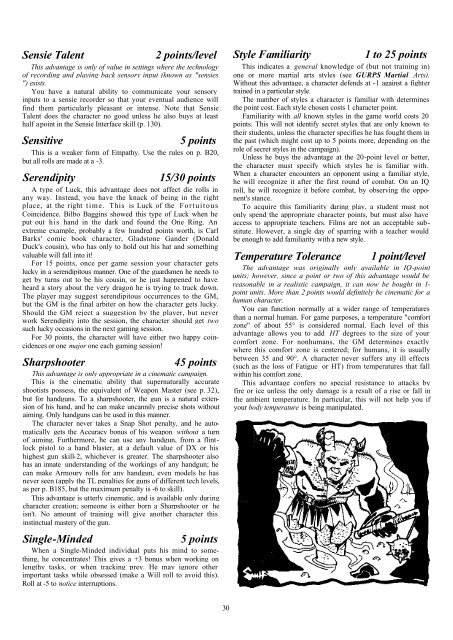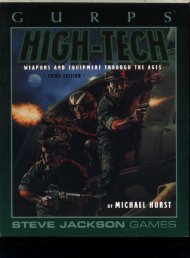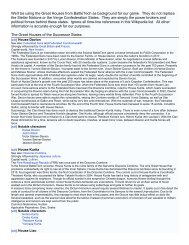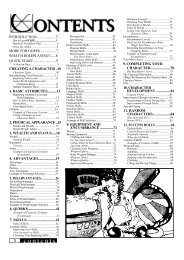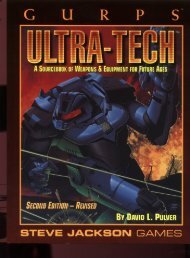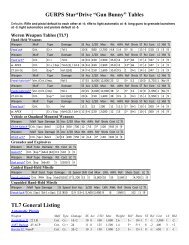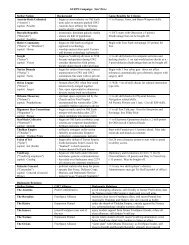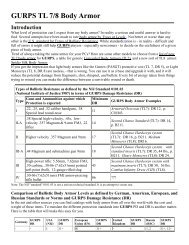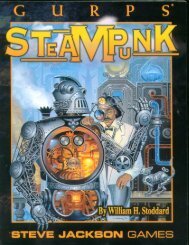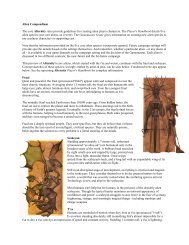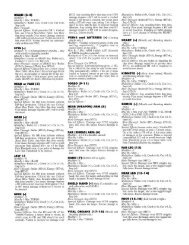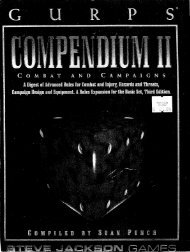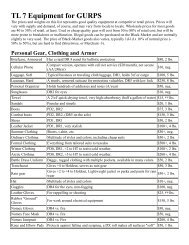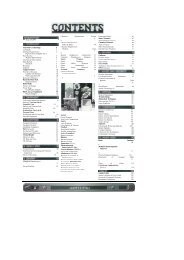GURPS - Compendium 1..
GURPS - Compendium 1..
GURPS - Compendium 1..
You also want an ePaper? Increase the reach of your titles
YUMPU automatically turns print PDFs into web optimized ePapers that Google loves.
Sensie Talent<br />
2 points/level<br />
This advantage is only of value in settings where the technology<br />
of recording and playing back sensory input (known as "sensies<br />
") exists.<br />
You have a natural ability to communicate your sensory<br />
inputs to a sensie recorder so that your eventual audience will<br />
find them particularly pleasant or intense. Note that Sensie<br />
Talent does the character no good unless he also buys at least<br />
half a point in the Sensie Interface skill (p. 130).<br />
Sensitive<br />
5 points<br />
This is a weaker form of Empathy. Use the rules on p. B20,<br />
but all rolls are made at a -3.<br />
Serendipity<br />
15/30 points<br />
A type of Luck, this advantage does not affect die rolls in<br />
any way. Instead, you have the knack of being in the right<br />
place, at the right time. This is Luck of the Fortuitous<br />
Coincidence. Bilbo Baggins showed this type of Luck when he<br />
put out his hand in the dark and found the One Ring. An<br />
extreme example, probably a few hundred points worth, is Carl<br />
Barks' comic book character, Gladstone Gander (Donald<br />
Duck's cousin), who has only to hold out his hat and something<br />
valuable will fall into it!<br />
For 15 points, once per game session your character gets<br />
lucky in a serendipitous manner. One of the guardsmen he needs to<br />
get by turns out to be his cousin, or he just happened to have<br />
heard a story about the very dragon he is trying to track down.<br />
The player may suggest serendipitous occurrences to the GM,<br />
but the GM is the final arbiter on how the character gets lucky.<br />
Should the GM reject a suggestion by the player, but never<br />
work Serendipity into the session, the character should get two<br />
such lucky occasions in the next gaming session.<br />
For 30 points, the character will have either two happy coincidences<br />
or one major one each gaming session!<br />
Sharpshooter<br />
45 points<br />
This advantage is only appropriate in a cinematic campaign.<br />
This is the cinematic ability that supernaturally accurate<br />
shootists possess, the equivalent of Weapon Master (see p. 32),<br />
but for handguns. To a sharpshooter, the gun is a natural extension<br />
of his hand, and he can make uncannily precise shots without<br />
aiming. Only handguns can be used in this manner.<br />
The character never takes a Snap Shot penalty, and he automatically<br />
gets the Accuracy bonus of his weapon without a turn<br />
of aiming. Furthermore, he can use any handgun, from a flintlock<br />
pistol to a hand blaster, at a default value of DX or his<br />
highest gun skill-2, whichever is greater. The sharpshooter also<br />
has an innate understanding of the workings of any handgun; he<br />
can make Armoury rolls for any handgun, even models he has<br />
never seen (apply the TL penalties for guns of different tech levels,<br />
as per p. B185, but the maximum penalty is -6 to skill).<br />
This advantage is utterly cinematic, and is available only during<br />
character creation; someone is either born a Sharpshooter or he<br />
isn't. No amount of training will give another character this<br />
instinctual mastery of the gun.<br />
Single-Minded<br />
5 points<br />
When a Single-Minded individual puts his mind to something,<br />
he concentrates! This gives a +3 bonus when working on<br />
lengthy tasks, or when tracking prey. He may ignore other<br />
important tasks while obsessed (make a Will roll to avoid this).<br />
Roll at -5 to notice interruptions.<br />
Style Familiarity<br />
1 to 25 points<br />
This indicates a general knowledge of (but not training in)<br />
one or more martial arts styles (see <strong>GURPS</strong> Martial Arts).<br />
Without this advantage, a character defends at -1 against a fighter<br />
trained in a particular style.<br />
The number of styles a character is familiar with determines<br />
the point cost. Each style chosen costs 1 character point.<br />
Familiarity with all known styles in the game world costs 20<br />
points. This will not identify secret styles that are only known to<br />
their students, unless the character specifies he has fought them in<br />
the past (which might cost up to 5 points more, depending on the<br />
role of secret styles in the campaign).<br />
Unless he buys the advantage at the 20-point level or better,<br />
the character must specify which styles he is familiar with.<br />
When a character encounters an opponent using a familiar style,<br />
he will recognize it after the first round of combat. On an IQ<br />
roll, he will recognize it before combat, by observing the opponent's<br />
stance.<br />
To acquire this familiarity during play, a student must not<br />
only spend the appropriate character points, but must also have<br />
access to appropriate teachers. Films are not an acceptable substitute.<br />
However, a single day of sparring with a teacher would<br />
be enough to add familiarity with a new style.<br />
Temperature Tolerance<br />
1 point/level<br />
The advantage was originally only available in IQ-point<br />
units; however, since a point or two of this advantage would be<br />
reasonable in a realistic campaign, it can now be bought in 1-<br />
point units. More than 2 points would definitely be cinematic for a<br />
human character.<br />
You can function normally at a wider range of temperatures<br />
than a normal human. For game purposes, a temperature "comfort<br />
zone" of about 55° is considered normal. Each level of this<br />
advantage allows you to add HT degrees to the size of your<br />
comfort zone. For nonhumans, the GM determines exactly<br />
where this comfort zone is centered; for humans, it is usually<br />
between 35 and 90°. A character never suffers any ill effects<br />
(such as the loss of Fatigue or HT) from temperatures that fall<br />
within his comfort zone.<br />
This advantage confers no special resistance to attacks by<br />
fire or ice unless the only damage is a result of a rise or fall in<br />
the ambient temperature. In particular, this will not help you if<br />
your body temperature is being manipulated.<br />
30


